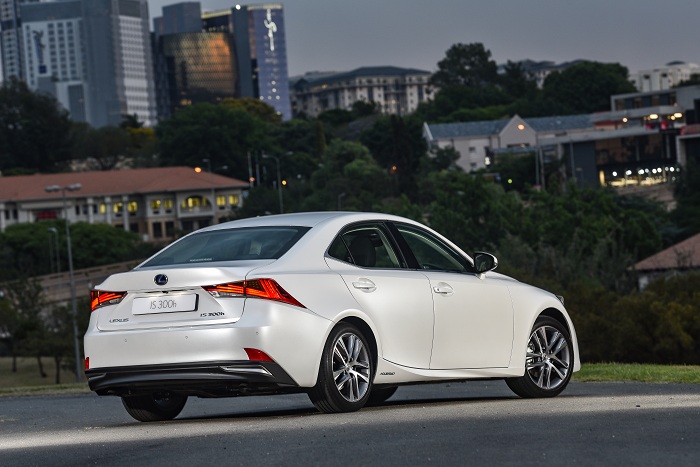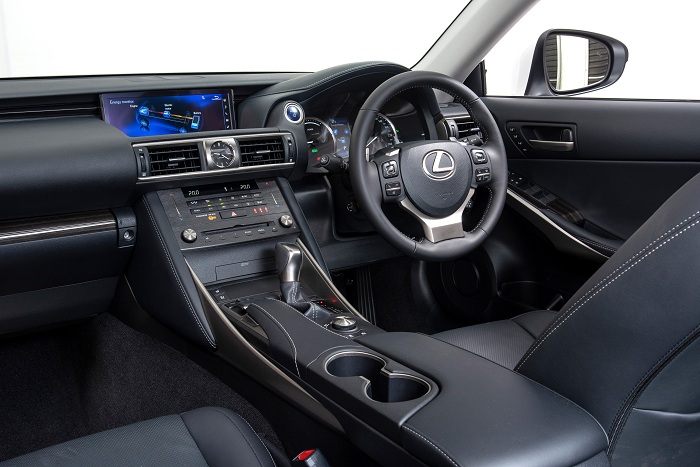The brand recently introduced its fourth hybrid model to the local line-up in the form of the IS 300h. I had a chance to sample the newcomer, along with a few other Lexus hybrid models in Johannesburg recently.
IS age a problem?
It’s no secret that the IS model range is rather aged by modern standards, with the current generation having been introduced in 2013 and then facelifted two years ago. Therefore, it was rather bizarre to be invited to the launch of a hybrid variant of the automaker’s soon-to-be-replaced entry-level, rear-wheel drive sedan.

According to those in the know at Lexus, the introduction of this model is to encourage consumers, who are concerned with the wellbeing of the environment, to switch to hybrid vehicles.
Hybrid solution
Personally, I feel that hybrid powertrains are a much better alternative to all-electric setups for a country like South Africa, due to the fact that we still burn dinosaurs to produce our rather limited supply of electricity. Commuters here also tend to travel long distances where the potential range anxiety produced by driving an electric car with limited charging infrastructure is very real.
The fact that hybrids such as the IS can operate in what is called EV (Electric Vehicle) mode, means that zero emissions driving within our polluted cities becomes a reality, while open-road cruising using a combination of an internal combustion engine and an electric motor makes sense.
The IS 300h

There’s nothing revolutionary about the hybrid powertrain found in the IS, but like many Lexus products, the relative mechanical simplicity usually ensures solid scores in reliability and ownership satisfaction surveys.
The 300h makes use of a familiar, if slightly tweaked version of the 2AR-FSE 2.5-litre engine which produces 133kW/221Nm, and works in tandem with a 650-volt electric motor for a combined system output of 164kW. The 300h will accelerate from 0-100km/h in 8.5 seconds and is electronically limited to 200km/h.
Driving hybrid
Lexus claim a fuel consumption figure of 4.9-litres/100km, however, on our congested launch route, that figure read well over 8.0-litres/100km. Aside from the consumption, there are two other annoyances that spoil what is otherwise a great vehicle to drive in terms of handling and refinement. The first issue lies with the CVT gearbox, which despite being one of the better examples in recent memory, still provides a less than satisfying drone and whining sound when pushing on a bit.
The second irritation is one that has plagued many a Lexus model, and that’s the infotainment system which features slightly out-of-date graphics and a rather frustrating joystick to operate the features of the system. A simple rotary dial would work far better. Aside from the infotainment quirks, the interior features good material quality and in many ways is a refreshing departure from its German rivals.
Lexus hybrids going forward
Aside from the IS 300h, the brand also has the rather impressive ES 300h, the crossover NX 250h and the range-topping RX 450h. Looking ahead, there will be hybrid versions of the LS, RC, LC and of course, the upcoming UX compact crossover.
Verdict
While quite clearly showing its age, the IS hybrid, along with the other Lexus Hybrid models that I had a brief encounter with are certainly a respectable mobility solutions for those in the premium segment with a slant towards
Service plan and warranty
The IS model range comes with a seven-year/105 000km warranty and full maintenance plan, while the hybrid model gets an eight-year warranty for its battery system.
Pricing
IS 300 EX - R715 400
IS 300h SE - R753 800
IS 350 F Sport - R806 400
















